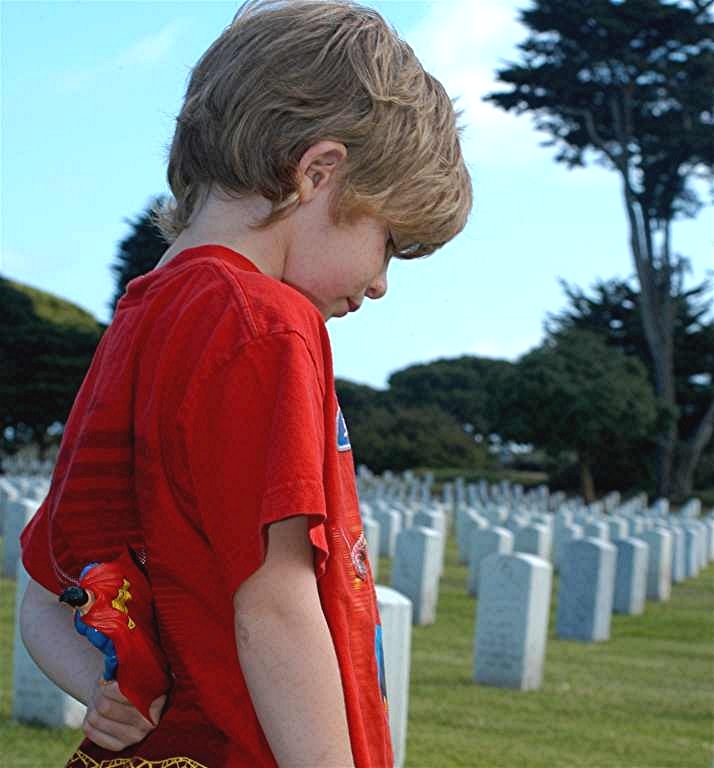 Death is a part of our everyday life, however, it never gets easy to deal with it. Actually, death represents one of the greatest emotional challenges we will face during our lifetimes. And, despite the fact that it happens so often, we will probably never get fully used to dealing with death. Especially, if it is a death of a person that is very close to us.
Death is a part of our everyday life, however, it never gets easy to deal with it. Actually, death represents one of the greatest emotional challenges we will face during our lifetimes. And, despite the fact that it happens so often, we will probably never get fully used to dealing with death. Especially, if it is a death of a person that is very close to us.
Adults struggle significantly with the concept of death, whether it comes to how to cope with losing the people closest to us or how to contend with our own inevitable demise. But, what about the children? When we know how much of an impact death has on us, it is difficult not to be concerned about discussing death with children, particularly with very young ones.
Avoiding Talking about Death
Many of us tend to avoid discussing death with children in order to protect them. However, it is important to know that explaining death to children, in a clear and honest way, will not damage them. In contrary, it will facilitate their cognitive and emotional development.
Children become aware of death long before we even realize it. They see dead animals or death on television. They hear about it in fairy tales and act it out in their play. If we talk with our children about the death we can give them much-needed information and prepare them better for future challenges.
What is Appropriate?
During childhood, children go through various stages of cognitive and emotional development. Therefore, we should keep in mind that our communication should be age-appropriate.
Communicating with very young children about any subject can be challenging, as they need brief and simple explanations. Therefore, when talking with them, short, concrete and familiar examples should be used. The most common suggestion is to explain death to children in terms of the absence of familiar life functions: breathing, eating, talking, thinking or feeling.
When talking about death, children may ask questions immediately or just process the conversation in silence and play, and come back later to ask more questions. It is strongly recommended to answer all questions children ask, and be honest when we do not know the answer. It is also recommended to sometimes check to see if the child understood what was said, as some children may get confused. Also, some children may ask questions over and over again, and as time passes they will need further clarification and sharing of ideas and feelings. It is very important to be patient and acknowledge the level of child’s cognitive and emotional development.
The Danger of Euphemisms
We have all used phrases like "passed away", "went to sleep", or "in a better place" when talking about death. However, when talking with children about death, we should avoid the use of euphemisms like that at any cost.
Young children are very concrete thinkers and they need adults to be relatively straightforward with them. If we are not straightforward, we run the risk of leaving them confused. For example, if we tell a child that a dead person is sleeping we run the risk of them either believing the dead person will wake up, or making them terrified to ever fall asleep again because they will not wake up. Even telling children that sickness can cause death can create problems if the truth is not tempered with reassurance. Young children are not able to differentiate between non-fatal and fatal illness, and minor ailments may begin to cause them unnecessary concern.
Religion and Death
As I mentioned before, young children are concrete thinkers. Therefore, they tend to interpret things literally. Different religious explanations that may seem comforting to us, may unsettle children. Saying that the dead person is with God now or that it was God's will may seem scary and make the child believe that God will come and get him or her.
Given the latter, it is very important to check with children to find out how they are hearing and seeing events around them. Various problems may arise from children's misconceptions about death. Theretofore, it is important to be aware what is appropriate and what is not appropriate when we talk with children about death.
What is OK to do?
Now, when we have a general understanding of what should we be watchful of when discussing death with children, I will mention some suggestions on how to approach discussions about death with children. The following is a list of general guidelines for talking about death with children.
* We should be aware of the child's developmental level.
* We should tell the child right away.
* We should be honest and sincere. If we do not know something, we should admit that we do not know the answer.
* We should be prepared for a variety of cognitive and emotional responses.
* We should not use euphemisms.
* We should be short and concise. We should share information in doses.
* We should express our emotions (e.g., cry). We should talk about thoughts and feelings we have with the child.
* We should allow our child to participate in rituals.
* We should let children grieve in their own way.
However, this is just a short list of suggestions, as it difficult to put them all on paper. Also, every child is unique, and, therefore, sometimes certain special considerations will need to be taken into account before talking with the child about death.
Role of a Psychologist
Psychologists are mental health professionals who possess knowledge which can help people who grieve, children and adults, with grief reactions through the tasks of grieving. As it was previously mentioned, death presents one of the greatest emotional challenges we will face in our lives. Therefore, talking with someone who can help can provide us with the much-needed guidance and support.
About the Author

Hilda Huj
, B.A., M.A. Hilda is a registered clinical counselling and forensic psychologist in Edmonton, Alberta. She specializes in working with youth, adults and families that have been impacted by trauma. She completed a Bachelor of Arts and Master of Arts degree in Psychology in Osijek, Croatia, and subsequently equated her academic credentials to Canadian standards. Currently, she volunteers with the Edmonton Police Services as a Victim Support Worker and also helps to promote Psychology by volunteering for the Psychologists’ Association of Alberta.
Office Location:
Suite 39, 9912 - 106 Street
Edmonton, Alberta
T5K 1C5
Canada
Phone: 7804289223
Contact Hilda Huj
Professional Website:
www.archpsychological.com